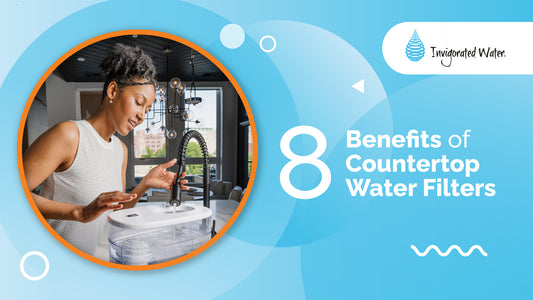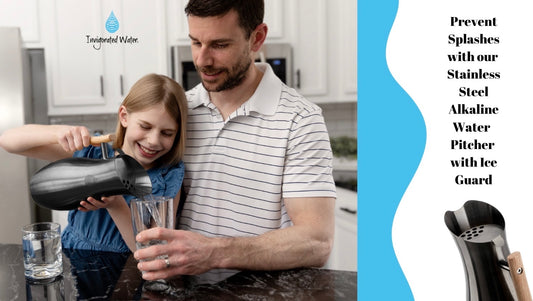
How to Make Tap Water Taste Better
While tap water in some places is not fit for drinking, in other places, it’s perfectly safe for consumption but simply not the most palatable option. If you live in a place where you could be consuming tap water safely but don’t want to because it tastes bad, this post is for you!
Let’s look into some of the reasons tap water might taste funky.
How to Make Tap Water Taste Better

Why Does Tap Water Taste Weird?
According to the Environmental Protection Agency (EPA) about 15% of people in the U.S. use water from private wells, while the remaining 85% obtain theirs from a municipal source.
Water supply systems differ from area to area. If your tap water doesn’t taste exactly like—well, water—the supply source of your tap water or the delivery system, i.e., plumbing and pipes (or both!) might be to blame.
So, should you be worried if your water tastes off? That depends. In most cases, tap water in the U.S. is safe to drink, but here’s what different tastes and smells in your water might be telling you:
A Fishy, Earthy, or Moldy Taste
If there’s a musty or fishy odor or flavor to your tap water, it might be due to algae or other organic matter in your water source. The bacteria from this matter can occur naturally in water, especially in surface sources such as rivers, lakes, or reservoirs.
You might notice a greater occurrence of this taste during certain times of the year, for example, in spring, when these kinds of organisms are more widely present in the water source.
It’s also possible that these bacteria could exist in your water supply system or even in your own sink drain!
While this is completely harmless and doesn’t affect the drinkability of your water, if you want to locate the source of the problem, you easily can. Put a little water in a narrow glass and walk away from your sink. Swish the water around in the glass and then smell it.
If there’s no smell, the issue is probably your sink drain. If it does still have an odor, your drinking water could be the problem.
Chlorine or Chemical Taste
These are probably the most common tastes in tap water, because chlorine is often used in water systems to treat the water supply. The smell or taste in your glass is from the residual, or the level of chlorine that is intended to be maintained in the system from the treatment plant to your sink.
This is an important additive to the water supply in order to protect consumers from a host of microorganisms that could be dangerous, including multiple types of viruses, parasites, and bacteria. And it’s a requirement of the EPA to ensure safe drinking water.
How strong the taste or smell of the chlorine is depends on how far the water has to travel to reach your home. This means the closer you live to the water treatment plant in your area, the likelier it is that your water will be more intensely chlorinated.
Although many people find the smell of chlorine in their water particularly unbearable and may not want to consume it, it’s actually perfectly risk-free. The levels of residual chlorine found in tap water are not harmful, and you can safely drink this water.
Bitter or Medicinal Taste
A bitter taste might indicate the presence of copper in your water. This usually arises when the water passes through corroded copper plumbing during the delivery process. This is usually not dangerous, because copper is only toxic to humans at much higher levels than are generally found in tap water exposed to corroded piping.
However, if you or anyone in your household notices any stomach cramps or intestinal discomfort, seek medical attention and notify your utility company or water supplier.
This flavor can also be caused by a high level of total dissolved solids (TDS), which are minerals— most often sulfates—dissolved in the water. These are largely harmless.
Metallic Taste
Iron, manganese, or zinc in your water could account for that metallic taste you might experience. This is most often due to metal from your plumbing system dissolving into the water, especially from galvanized pipes. Iron and manganese can also be naturally present in water sources.
This taste is likely most strongly present after new pipes are installed, but usually reduces over time as the flowing water in the plumbing causes a layer of limescale or metal oxide to form. This coating essentially insulates the piping from the water and prevents the metals from dissolving into the water supply.
The presence of these substances in your water doesn’t make it unsafe, but if you want to avoid the taste, you can run the faucet to get rid of water that’s been sitting in the pipes for a while.
Now you know what the different smells and tastes in your water might indicate. But that doesn’t really change much! Even though it’s mostly harmless, what if you just don’t like the taste or smell of your tap water?
What Can Make Tap Water Taste Better?
There are a few things you can do to level up your tap water and get rid of any strong smells or tastes.
Infuse Water with Another Flavor
One of the best ways to change the flavor of your water is to overpower it with another stronger and better taste. You can use a variety of ingredients to infuse your water, depending on your personal inclination and preferences.
A good choice is something with a bold taste that can offset any odors or tastes you usually notice in your water. Some contenders include lemon or lime, mint, cucumber, basil, ginger, cinnamon, strawberry, raspberry, mango, or other fruits you like. Try out different flavor combinations and see what you enjoy most!
Because it tastes and smells delicious, infused water also encourages greater hydration.
Use a Water Filter
The best way to make tap water taste better (and make it good for you!) is a good tap water filter. Water filters for sinks are the easiest way to ensure all impurities are removed from your tap water at the source, and you get safe, healthy water right out of the faucet.
A good choice is to use an alkaline water filter for your sink. This kind of filter attaches right onto your faucet and removes a variety of substances from your tap water, making it cleaner, tastier, and better for you.
Here at Invigorated Water, you can choose between two different alkaline water filters for sinks:
pH Purify Faucet & Tap Water Filter
pH Regenerate Faucet Water Filter
Both tap water filters are super easy to install and last for a long time. In general, the filters do not need to be replaced more than once in 6–12 months, depending on a few factors, including the:
1. Water source
2. Frequency of usage, and
3. Regularity of maintenance and cleaning.
How Do You Filter Tap Water?
Invigorated Water’s tap water filters incorporate multiple stages of filtration to remove potential contaminants and add nutrients to the water:
💧Sediments, including dirt, rust, sand, and debris, are filtered out through a screen💧Water flows through a carbon block, which absorbs any chemicals
💧Clean water continues through the filter and minerals are added to it
These filters remove potentially harmful and undetectable pollutants from the water and improve the smell and taste.
They can be used as kitchen tap water filters in addition to functioning as a water filter for the tap in your bathroom, ensuring that the water around your house is equally safe everywhere.
Why Alkaline Water Filters?
In addition to removing contaminants, alkaline tap water filters increase the pH of your water, which has its own benefits!
Water from these filters contains antioxidants, which are important for maintaining cell health and may play a key role in protecting your body from a variety of diseases, including cancer, heart disease, and other conditions.
Alkaline water has been linked to better bone health, reduction in symptoms of acid reflux, and lower blood pressure, blood sugar and cholesterol levels. These benefits alone make an alkaline filter for tap water a sound—and affordable—investment.
How to Make Tap Water Taste Better: Conclusion
Tap water is not always completely reliable. While it is safe to drink in most places here in the U.S., there is usually no way to know if any dangerous substances or contaminants exist in your water without sending a sample to a lab for testing.
The safest option is to use a tap water filter to ensure the removal of any pollutants in the water supply. While there are many options available for kitchen tap water filters, using an alkaline water filter for your sink is just a smarter decision.
In addition to ensuring your drinking water is free of chlorine, fluorides, heavy metals, and other toxins, it also adds minerals to the water and improves its smell and taste. These additions and the increase in the water’s pH extend a variety of health benefits to you and the members of your household.
Related Reading:
Types of Water Filters & How to Choose The Right One
**Did you know? We’re offering free U.S. Standard shipping on ALL orders!**






